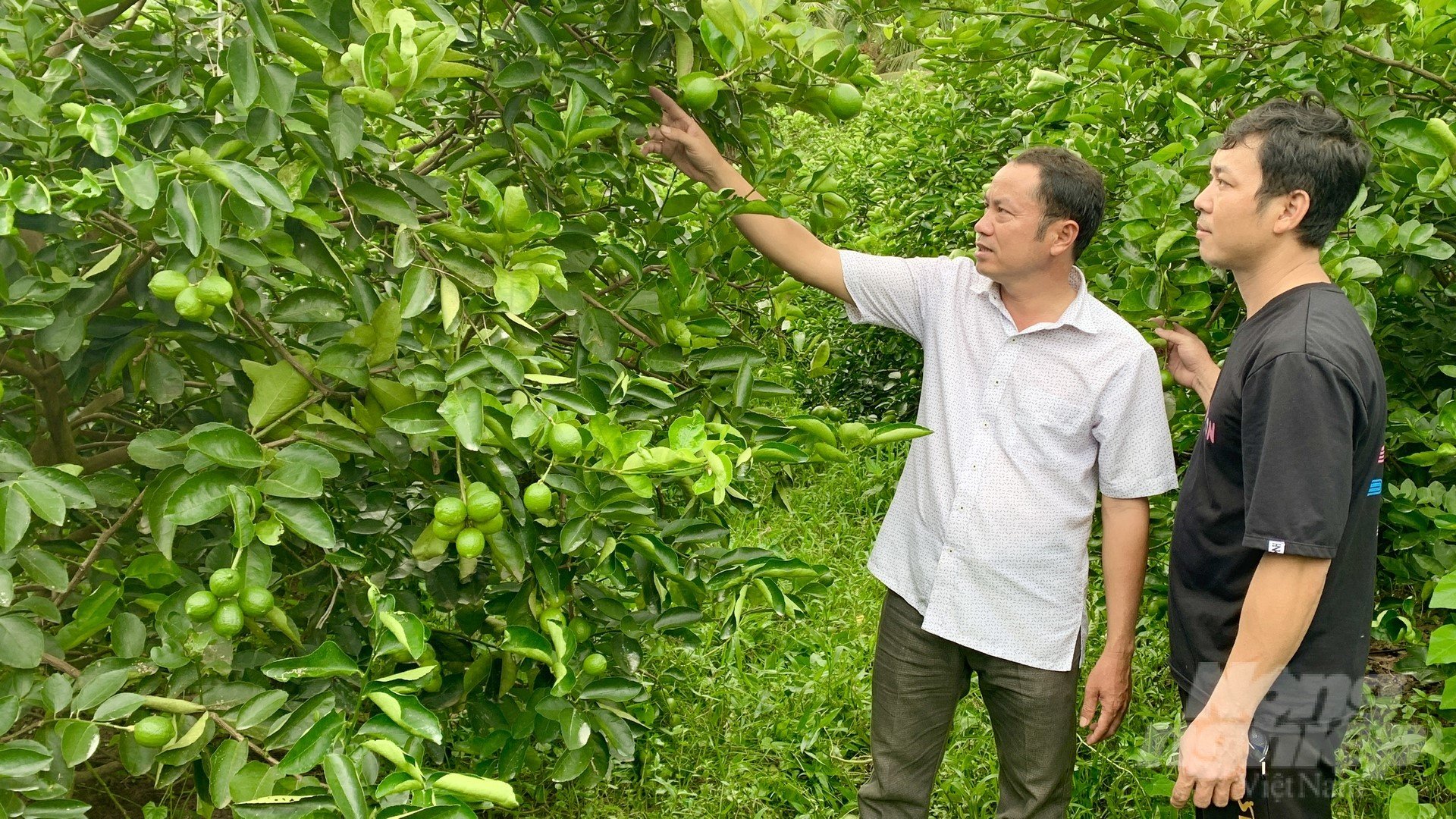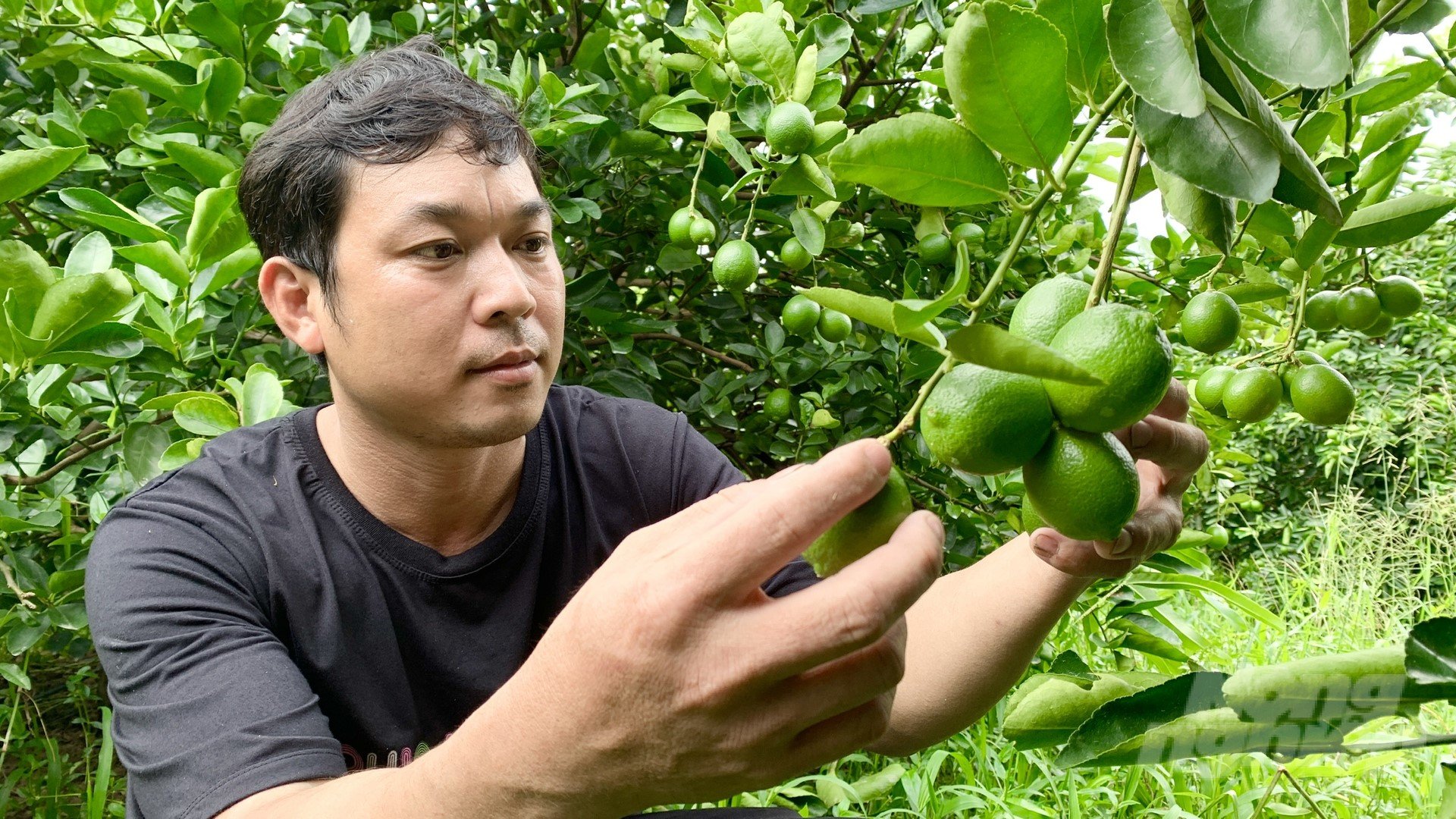May 19, 2025 | 14:28 GMT +7
May 19, 2025 | 14:28 GMT +7
Hotline: 0913.378.918
May 19, 2025 | 14:28 GMT +7
Hotline: 0913.378.918

Growing seedless lemons helps many Tra Vinh farmers improve their economies. Photo: Ho Thao.
When arriving in Huyen Hoi commune, Cang Long district, we could not ignore the scene of green lemon gardens laden with fruit next to the spacious new houses of the people. According to reports, in the past, growing rice and coconuts used to be the main activities of local residents but did not bring significant profits. This prompted them to look for new solutions, and growing seedless lemon trees emerged as an outstanding option.
Mr. Phan Duc Tai, Director of Thanh Tri seedless lemon growing cooperative, is a pioneer in growing this type of tree. He did a lot of research on seedless lemons and explored export opportunities to Europe. Through cultivation in compliance with international standards, Thanh Tri seedless lemon growing cooperative has established a linkage between farmers and export businesses. The cooperative has signed a seedless lemon export contract with a company in the Netherlands, an important European market, with a volume of goods up to 100 tons/year.
Thanh Tri seedless lemon growing cooperative complies with the GlobalGAP international standard. Farmers participating in the cooperative enjoy a lemon price of VND 10,000/kg or more. Moreover, when buying fertilizers and pesticides, they also enjoy preferential prices without intermediaries.
Mr. Phan Duc Tai said: "The seedless lemon fruits form clusters with thin skin and less sour water without a bitter taste. Seedless lemon is used as a refreshment with a delicious taste and excellent cooling effect, so it is favored in the market. To improve business performance, the cooperative is planning to expand its economic activities by combining models of gardens, ponds, and stables. Besides, we have cooperated with large businesses to expand okra and papaya growing activities in order to create more income for the cooperative’s members".
The success of Thanh Tri seedless lemon growing cooperative has inspired other farmers. Recently, many households in Huyen Hoi commune have transformed from growing coconuts into growing seedless lemon trees. One of them is Mr. Nguyen Van Danh from Soc hamlet, who bought seeds from the cooperative and planted them on a land area of 4,000 m2.
According to Mr. Danh, the seedless lemon tree only needs proper care for about 17 months to begin to bear fruit, and the planting technique is also simpler than that of other trees. The selling price is stable from VND 20,000 to 30,000/kg in the peak months, while the low price is also from VND 15,000 to 20,000/kg. He can harvest every two weeks with an annual income of about VND 400 million from 4,000 m2 of lemon-growing land. The largest difficulty in growing lemon trees is harvesting because it requires hiring workers to pick fruits at a price of VND 200,000/person/day.

Seedless lemons are purchased by the cooperative at a stable price of VND10,000/kg or more. Photo: Ho Thao.
The success of growing seedless lemon trees in Huyen Hoi commune, Cang Long district, Tra Vinh province, is a typical example of the creativity and taking advantage of opportunities of Vietnamese farmers. Through cooperation, compliance with international standards, and expansion of export markets, they have achieved success and created economic benefits for the community. This story not only proves the development potential of Vietnam's agriculture but also contributes to the development of the national economy.
Mr. Nguyen Thanh Tung, an agricultural officer in Huyen Hoi commune, also shared that the Thanh Tri seedless lemon growing cooperative initially had financial difficulties but was fortunate to receive support from the Commune People's Committee in the amount of VND 30 million. This has played an important role in promoting the cooperative’s development. Currently, the main market of the cooperative is Europe, and this cooperative’s success has increased its number of members from the original 10 households to over 100 households.
At the same time, the growing area has been expanded, and new job opportunities have been created for local workers. The successful lemon-growing model not only brings high income to many households but also contributes to improving the quality of life in the community. Farmers in the region have demonstrated their ability to adapt to changes and take advantage of new opportunities to improve their lives. Through the expansion of exports to Europe, Tra Vinh seedless lemon has affirmed its quality and reputation in the international market.
Translated by Huyen Vu Thu

(VAN) On May 15, Ministry of Agriculture and Environment of Vietnam hosted the 'Connecting Vietnam - Germany agricultural, forestry and fishery trade' seminar in Berlin, Germany.

(VAN) In the face of counterfeit and imitation products, Khanh Hoa Salanganes Nest Company hopes for the prompt completion of the legal framework, strict enforcement against violations, and protection of the bird’s nest brand.

(VAN) Japan's efforts to lower the price of rice through the release of its stockpile may finally be making some progress, albeit at a snail's pace.

(VAN) U.S. tariffs are not only a 'shock', but also an opportunity for Vietnamese businesses to renew their mindset toward comprehensive development.

(VAN) As Bac Giang lychee enters the harvest season, Minister Do Duc Duy expects that the fruit will contribute greatly to agricultural exports due to standardized production and deep processing.

(VAN) Consumers have shown a preference for free-range eggs, but those farming systems are more vulnerable to biosecurity risks like bird flu.
/2025/05/09/5701-1-184335_301.jpg)
(VAN) Vietnam’s eel exports nearly doubled thanks to a mud-free farming model, opening up new prospects while still facing numerous barriers related to international standards.